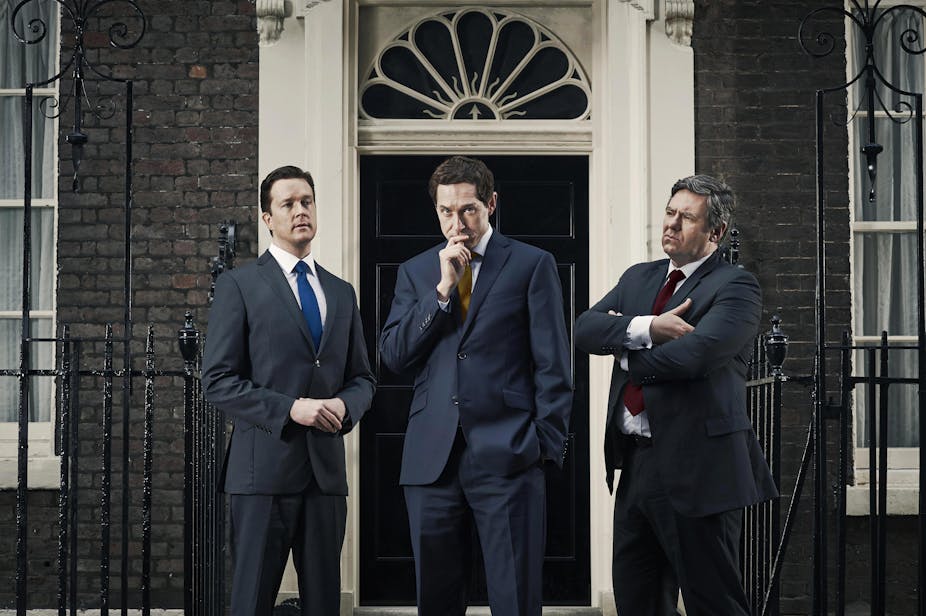James Graham is that precious thing: a dramatist who takes politics seriously. Unlike his peers he does not use politics as the excuse for cheap jokes that exploit Britons’ ill-informed cynicism about those we elect to govern in our name.
His 2012 play This House looked at how Labour and Conservative whips were forced to work together during the minority Wilson and Callaghan governments of the 1970s. It was a great success – at least with National Theatre audiences, an overwhelmingly middle class and mature group.
As in This House, so in his first television drama, Coalition, broadcast on Channel 4 on Saturday March 28. Here Graham shows how essentially decent men (and a woman) struggle with an almost impossible situation to make representative democracy work. In the case of Coalition he focuses on the five frenetic days between the 2010 election result and the formation of Britain’s first post-war coalition government, the beginning of what was sold as a new kind of politics.
Unusually for a television political drama, there are no villains. Even Mark Gatiss’s portrayal of Peter Mandelson, while archly camp, never degenerates into a pantomime villain – although he does first appear amidst a puff of smoke. The three party leaders are all presented in their best possible light, at times humourous and humble, exhibiting little hubris. Gordon Brown’s infamous temper is never shown: at worst he is no more than a little impetuous. Graham wants the audience to empathise with the political class during a uniquely difficult period, showing them to be just like us: why, some are even shown smoking and swearing.

Noble Nick
Graham’s central protagonist is Nick Clegg: “You’re a good man Nick,” Brown repeatedly says at one point. He certainly emerges from Coalition as an admirable character. The drama starts with the Liberal Democrat leader shooting to prominence thanks to the first television debates. But he’s quickly cast into despair when a twisted electoral system gives his party fewer seats than in 2005, until he realises that Cameron’s failure to win a Commons majority has presented his party with a great opportunity to finally exercise power.
The drama generally takes Clegg’s avowed desire to achieve “real reform” in office on trust. “It’s for the greater good” he tells his sceptical party while trying to convince them of the need to enter into what many feel is an unholy alliance with the Tories. We’re meant to think that that is what he actually believes.
As a kind of Borgen made real and British, Coalition rehearses the argument also made in the 2012 movie Lincoln: that in politics good things can come from compromise, from deals and dark business. And while Clegg did not exactly free the slaves in 2010, Graham seems to believe that he did the right thing by entering office. For in so doing, it is claimed at the end of the drama, he made multi-party politics possible, that being – we are induced to think – a vast improvement on the two-party duopoly rejected by the electorate in 2010.
Graham’s positive view of the coalition is highlighted by those he shows opposing the two young men at the centre of its making. There will be few Tory backbenchers happy at being depicted as a bunch of angry old men. When one announces that Margaret Thatcher didn’t like coalitions, I suspect audiences are meant to take it as a point in favour of coalitions. And, if Paddy Ashdown finally supports Clegg, he is throughout most of the drama a wistful oppositional voice from the past, one not in tune with the needs of 2010.
Too sympathetic?
But in his almost revolutionary desire to empathise with our political leaders has Graham gone too far? Certainly, Clegg’s willingness to ditch much of his party’s 2010 manifesto, most infamously the pledge to abolish tuition fees, is dispatched in the blink of an eye. The audience is presumably meant to accept Clegg’s assertion that “there is no money”, a contentious claim then put about by the Conservatives. For, if Graham is right to show our politicians as human beings – and encourages us to feel sorry for Gordon, to sympathise with Nick and to share David’s frustration, he does push their politics to the background. Politicians are human; but they are also politicians.
As in The Deal, Channel 4’s 2003 dramatisation of the troubled Blair-Brown relationship, at the end of Coalition the actors are replaced by those they portray, cutting to footage of the real Cameron and Clegg in the Downing Street Rose Garden. As with The Deal there will be some viewers who will accept Graham’s account – we know that such drama-documentaries have a special power to convince.
I don’t know how many will watch Coalition but it will be surprising if given the competitive nature of Saturday night schedules many more than a million do. This is of course many times more than saw This House in the National Theatre but very probably such viewers will be already confirmed in their interest in and knowledge of the workings of representative democracy. Those millions glued to Casualty or still chuckling after Ant and Dec’s Saturday Night Takeaway, many of whom consider “politician” a term of abuse, will not have seen Graham’s optimistic interpretation of our recent political past.
This is a pity, because, whatever questions there might be over its take on events, Coalition brings out the emotion, excitement and humour of those few days in May 2010, ones which punctures many of the populist stereotypes about our political class, ones which explain why the nation is currently yawning its way to another general election.

